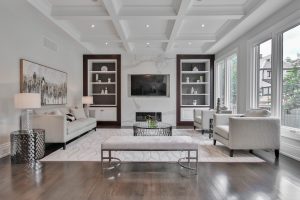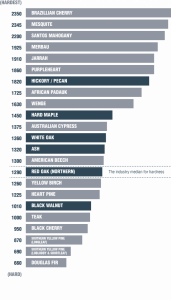Preventing damage to your flooring is one of the best things you can do to keep your hardwood floors in great condition for years to come. It’s unrealistic to think your floors will never get damaged, because light wear and tear is normal. However, there are a few key steps you can take to prevent more damage than necessary.

Source: Unsplash
Preventing hardwood flooring damage starts even before you install your flooring. If you are in a position where you can pick your own flooring, it’s best to research what type of hardwoods will work best for your house. Some hardwoods naturally have character and more “imperfections” that are better at hiding scratches. Species like White Oak and Red Oak and Hickory are known for these characteristics, and might be a good option in high traffic areas with kids or pets. You can read more about hardwood flooring textures here.
Understanding where species of wood falls on the Janka scale is also important. The Janka scale rates the durability and hardness of hardwood flooring, which is an important factor in understanding how different styles of floors will hold up long term.

Source: superiorflooring.ca
After you purchase and install your hardwood floor, moving furniture as minimally as possible is crucial. Dragging larger pieces like tables and sofas give a greater possibility of scratching. If you do see yourself having to move furniture periodically, it’s best to invest in felt pads or protectors that attach to the bottom of furniture. Even if you don’t plan on moving furniture, adding these small preventative elements can help protect your hardwoods from accidental sliding. Remember, if you do need to move a piece of furniture, you should always lift and never drag.
It’s also critical to maintain consistent levels of moisture and humidity in your home. Excessive moisture in your home can cause your floors to expand, while too little moisture can cause hardwoods to contract and shrink. In order to maintain proper humidity levels, we recommend using an air conditioner, dehumidifier, or a humidifier in the winter. Wood species will react differently in different geographic locations, so make sure you understand what types of hardwood flooring works best for your climate before you buy.
Other ideas to keep in mind are to try and prevent any water damage from occurring in the first place, and installing curtains to minimize sun exposure. It’s best to occasionally rearrange furniture (with protective padding!) every few years to prevent sun damage in isolated areas as well.
Also remember to be cautious when cleaning. No vinegar and water! Some products, like Rejuvenate, have been known to destroy certain types of hardwoods. We highly recommend our very own MacDonald Easy Hardwood Floor Cleaner to ensure no damage is done to your floors. With these tips in mind, your hardwood floors should be glowing for years to come.